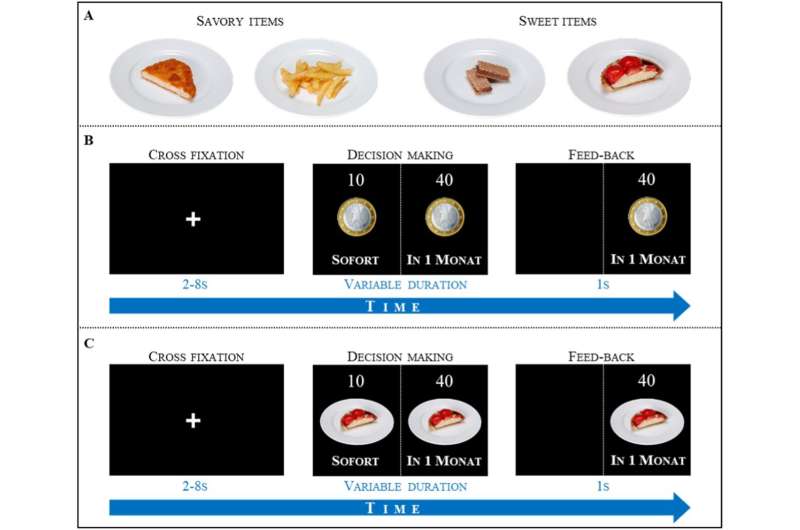This article has been reviewed according to Science X's editorial process and policies. Editors have highlighted the following attributes while ensuring the content's credibility:
fact-checked
peer-reviewed publication
trusted source
proofread
What happens in the brain when we make decisions about money or food

Neuroscience researchers from Bochum confirm different strategies when choosing between primary and secondary rewards. The lever is impulsivity.
People make decisions every day—from what to wear in the morning to what to watch on TV in the evening. But how do decisions differ when it comes to essential food and money? A neuroscientific research team at Ruhr University Bochum has investigated this question.
Led by Professor Burkhard Pleger from the Berufsgenossenschaftliches Universitätsklinikum Bergmannsheil, the team examined the mechanisms underlying human decision-making when it comes to so-called primary rewards such as food as opposed to secondary rewards such as money. The scientists also analyzed in which areas of the brain the different mechanisms can be located. The results of the study were published in the journal eNeuro.
Behavioral patterns and brain responses in the focus of research
Do people decide differently about French fries and strawberry cake than they do about money? This is exactly what scientists at Ruhr University Bochum investigated. They presented 28 test subjects according to their preference with French fries or schnitzel, strawberry cake or chocolate bars as well as money and let the test subjects choose whether they wanted to receive a certain amount of the item immediately or a larger amount at a later point in time.
In the experiment, the suggested waiting times were two days, two weeks, one, three and six months as well as one year. The longer the test subjects decided to wait, the larger the reward in terms of an increased amount of money or food. Throughout the study, the participants were placed in an MRI scanner that recorded the brain activity.
Value stability of money and perishability of food influence the choice
"We were able to show that decisions on food are made more impulsively. In other words, food that is immediately available is chosen more often than a larger quantity of the same food that is available later," explains first author Marius Markmann. "This is different with money. Here, people prefer to wait for the larger amount of money. This is because money is stable in value for longer, while the value of food is linked to the perishability of the food."
The observed differences were also reflected in brain activation during decision-making. "When choosing an amount of money, the human brain seems to involve regions that are responsible for monitoring actions. With food, on the other hand, brain regions that are important for decisions in the social environment become active," says Pleger, who is a Principal Investigator at the Research Department of Neuroscience at Ruhr University.
"However, the differences in the brain networks were less than we expected. This suggests that decisions about food and money follow similar processing patterns in the human brain."
Decision-making processes in connection with addictive behavior
Many studies have already shown that the human brain reacts differently to so-called primary rewards such as food than to secondary rewards such as money. How this is reflected in human behavior has been less researched to date. "We have found the lever in impulsivity: Primary rewards such as food lead to more impulsive decisions," says Markmann, who works as a doctoral student in neurological research at the Universitätsklinikum Bergmannsheil.
"Our result fits in with the findings of other studies. Impulsive people showed weaker self-control and had larger calorie intake and a higher eating frequency. They were also more inclined to be addicted to the internet, social media, smartphones, gaming and gambling."
In this context, the researchers from Bochum also see the next interesting research question regarding human decision-making. "In people with addictive behavior, self-control over primary rewards is a critical issue," says Pleger. "If we could identify which specific decision-making processes play a role in addictive behavior, this could lead to novel behavioral therapeutic interventions."
More information: M. Markman et al, Differences in Discounting Behavior and Brain Responses for Food and Money Reward, eNeuro (2024). DOI: 10.1523/ENEURO.0153-23.2024



















